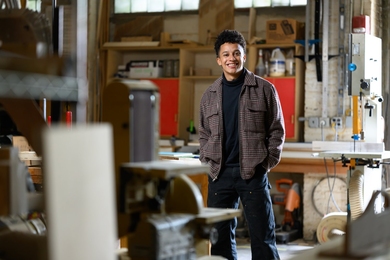Ali S. Argon SM '53, ScD '56, the Quentin Berg Emeritus Professor of Mechanical Engineering, passed away on Dec. 21, 2019, at the age of 89. A world-leading expert in the mechanics of materials, Argon’s pioneering research furthered the field’s understanding of inelastic deformation and fracture of materials including metals and alloys, ceramics, glasses, polymers, and composites.
Argon was born in 1930 in Istanbul, Turkey, to a Turkish father and a German mother. After completing high school in Turkey, Argon moved to the United States, where he obtained a bachelor of science degree from Purdue University in 1952. He then enrolled in graduate school at MIT, where he studied materials science under Professor Egon Orowan. Argon received his master’s degree in mechanical engineering from MIT in 1953 and his doctoral degree in 1956. His doctoral thesis examined the strength and anelasticity of glass.
After receiving his doctorate, Argon spent two years working on Van de Graaf particle accelerators for both research and medical applications at the High Voltage Engineering Corporation in Burlington, Massachusetts. He then returned to Turkey in 1958 to serve in the Turkish Army Ordnance Corps.
In 1960, after two years of military service, Argon returned to MIT, having accepted a faculty position in mechanical engineering. By 1968, he was named a full professor. In 2001, Argon was named the Quentin Berg Professor of Mechanical Engineering at MIT.
Throughout his career, Argon combined novel experiments with theoretical and computational modeling to deepen the understanding of inelastic deformation and fracture of engineering materials. His research shed light on the connections between microstructure and macroscopic deformation and failure properties of engineering solids.
Having published 335 research works, Argon is one of the most-cited researchers in the field of mechanics of materials. Along with co-author Frank A. McClintock, he wrote the seminal text “Mechanical Behavior of Materials” (Addison-Wesley, 1966). As one of the first books to provide an overview of the mechanical behavior of metals as well as ceramics, rubbers, and polymers, many consider the work as the beginning of the mechanics and materials field.
In addition to his impactful research contributions, Argon was a dedicated educator throughout his career at MIT. He mentored over 30 doctoral students, many of whom have gone on to become leading experts in the field. In the mid-1990s, Argon helped reshape the graduate program in mechanical engineering at MIT by leading an ad hoc committee. Under his leadership, the committee put forth recommendations for graduate programs designed for students interested in pursuing careers in industry.
Argon received numerous awards and honors in recognition for his research contributions. In 1989, he was elected to the National Academy of Engineering for “major contributions to the understanding of deformation and fracture of engineering materials through the application of mechanics to microstructure." He was also made a fellow of the American Physical Society. Among his many awards are the ASME Nadai Medal, ETH’s Staudinder Durrer Medal, and the Heyn Medal of the German Materials Society. In 2005 he received an honorary doctoral degree from his alma mater, Purdue University.
Argon is survived by his wife, Xenia (nee Lacher), and his son, Kermit. He was predeceased by his daughter, Alice, in 2015.






